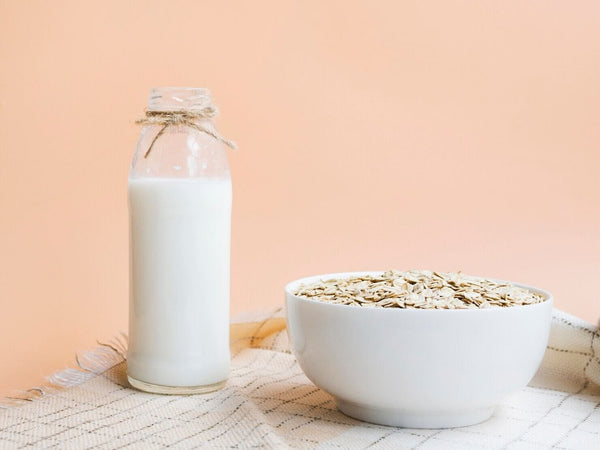Does Oat Milk Contain Phytic Acid?
What is phytic acid?
Phytic acid, also known as phytate, serves as a natural storage compound of phosphorus in plants.
It's commonly found in various grains, nuts, seeds, and legumes.
Phytic acid plays a vital role in plant growth and development, but its impact on our health has recently sparked some debate.

Is phytic acid bad?
We first need to understand that minerals like calcium, iron and potassium are essential for a range of bodily functions from nerves to heart health.
As humans, we absorb much of these minerals from food, so ensuring your diet provides enough mineral-rich foods is important to remain healthy.
Bad - it's an antinutrient
High concentrations of phytic acid in foods have been shown to inhibit the absorption of these minerals within the digestive tract.
Some studies have termed phytic acid an "antinutrient," binding to calcium, iron, zinc, and magnesium, and impeding their absorption.
Good - it's an antioxidant
However, there are two sides to this argument, with countering research suggesting that phytic acid possesses antioxidant properties and may offer benefits for cholesterol management and blood sugar regulation.
Whilst further research is ongoing on the topic, the conflicting findings underscore the complexity of this compound's effects on our health.
Do oats naturally contain phytic acid?
Like many grains and seeds, oats naturally contain relatively high concentrations of phytic acid, which is primarily located in the outer layers of the oat groat, also known as the bran.
The quantity of phytic acid present in whole oats depends on factors such as the specific oat variety and processing methods.
However, the phytic acid content of whole oats doesn't directly translate to oat milk.
Why is the phytic acid content in oat milk important?
Oat milk is a popular milk alternative, and given dairy’s reputation as a source of calcium, it’s important to unpack the phytic acid content of oat milk to subsequently understand the bioavailability of minerals in oat milk.
This is especially important in oat milk which has been fortified with minerals like calcium, as high levels of phytic acid could render the added calcium useless.
So does oat milk contain phytic acid?
Fortunately, the production process of oat milk largely removes concerns about phytic acid. This is because before turning oats into oat milk, the outer bran of the oat is removed.
Remember this is the part of the oat with the highest highest concentration of phytic acid.
Whilst the removal of the bran to make oat milk is primarily because it’s non-soluble, it also has the dual benefit of massively reducing the phytic acid content of the oats.
Whilst the inner layer of the oat used for oat milk does contain phytic acid, it’s present in much smaller quantities and processes like soaking the oats can further reduce these levels.
As a result, you can enjoy oat milk without worrying about the potential effects of phytic acid on mineral absorption. Phew!
Furthermore, minerals added to oat milk like calcium and iron are largely considered to be bioavailable.
If you are looking for a fortified oat milk brand, check out Overherd oat milk, which is fortified with calcium and vitamin B12. Plus it’s made with organic and gluten free oats.
How do other plant milks compare in terms of phytic acid?
While almond milk is also considered low in phytic acid, soy milk, derived from soybeans, tends to have higher concentrations.
Although please note that the processing methods of these alternative milks can have an impact on their phytic acid levels.
Should you avoid eating whole oats then?
No. Whilst whole oats do contain relatively high concentrations of phytic acid which can inhibit mineral absorption, research has shown that this largely occurs on a meal-by-meal basis.
Therefore as long as you are getting minerals elsewhere in your diet it doesn’t pose a risk to your health.
It’s also important to mention that oats have a range of beneficial health properties beyond the potential antioxidants found in phytic acid.
Whole oats are rich in vitamins and contain beta-glucans, a prebiotic fibre that supports heart health and cholesterol management.
